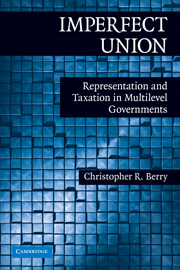Book contents
- Frontmatter
- Contents
- Preface
- Acknowledgments
- 1 Introduction: American Politics in 3D
- 2 What's Special about Special-Purpose Governments?
- 3 A Political Theory of Special-Purpose Government
- 4 Piling On: The Problem of Concurrent Taxation
- 5 Specialization and Quality
- 6 Governing the Fiscal Commons
- 7 Conclusion
- Methodological Appendix
- References
- Index
- Title in the series
Methodological Appendix
Published online by Cambridge University Press: 05 June 2012
- Frontmatter
- Contents
- Preface
- Acknowledgments
- 1 Introduction: American Politics in 3D
- 2 What's Special about Special-Purpose Governments?
- 3 A Political Theory of Special-Purpose Government
- 4 Piling On: The Problem of Concurrent Taxation
- 5 Specialization and Quality
- 6 Governing the Fiscal Commons
- 7 Conclusion
- Methodological Appendix
- References
- Index
- Title in the series
Summary
This appendix serves two purposes. First, I provide additional details regarding data issues, definitions, and case selection. Second, I present a variety of additional analyses supporting the main findings in the text and discuss more technical econometric issues. The reader who is not concerned with the data and econometric details can skip this appendix without missing any important substantive content.
DATA ISSUES
COG Data on Special Districts
The primary source of data for the government finance and organization variables used in my analyses is the COG. Like any data source, this one has strengths and weaknesses. The strengths of the COG are its comprehensive coverage of U.S. local governments, its historical comparability from the 1970s on, and the breadth of its coverage of government finance variables. The weaknesses of the COG are a matter of some dispute, as evidenced in the exchange between Leigland (1990) and Sacks (1990). Foster (1997, pp. 81–84) also reviews data quality issues related to the COG.
Leigland (1990) is highly critical of the COG and raises two primary concerns about the data on special districts. First, he argues that the Census Bureau overcounts special districts that are functionally inactive. For example, he shows that in the 1982 COG, 24 percent of special districts reported no expenditures, but the Bureau classified only 1.5 percent of districts as inactive.
- Type
- Chapter
- Information
- Imperfect UnionRepresentation and Taxation in Multilevel Governments, pp. 197 - 232Publisher: Cambridge University PressPrint publication year: 2009



